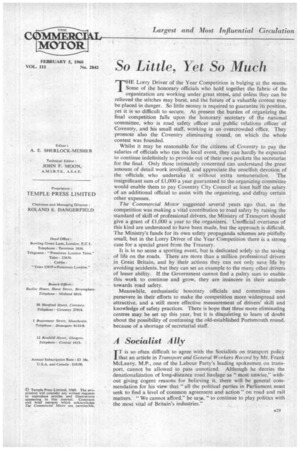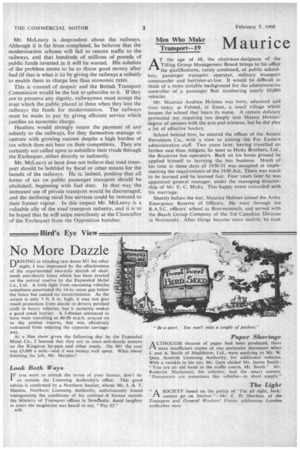A Socialist Ally
Page 37

Page 38

If you've noticed an error in this article please click here to report it so we can fix it.
IT is so often difficult to agree with the Socialists on transport policy that an article in Transport and General Workers Record by Mr. Frank McLeavy, M.P., one of the Labour Party's leading spokesmen on transport, cannot be allowed to pass unnoticed. Although he decries the denationalization of long-distance road haulage as "most unwise," without giving cogent reasons for believing it, there will be general commendation for his view that "all the political parties in Parliament must seek to find a level of common agreement and action' on road and rail matters. "We cannot afford," he saw, "to continue to play politics with the most vital of Britain's industries." Mr. McLeavy is despondent about the railways. Although it is far from completed, he believes that the modernization scheme will fail to restore traffic to the railways, and that hundreds of millions of pounds of public funds invested in it will be wasted. • His solution of the problem seems to be to throw good money after bad (if that is what it is) by giving the railways a subsidy to enable them to charge less than economic rates.
This is counsel of despair and the British Transport Commission would be the last to subscribe to it. If they are to preserve any dignity, railwaymen must accept the trust which the public placed in them when they lent the railways the funds for modernization. The railways must be made to pay by giving efficient service which justifies an economic charge.
Hauliers would strongly resent the payment of any subsidy to the railways, for they themselves manage to operate with growing success despite a high burden of tax which does not bear on their competitors. They are certainly not called upon to subsidize their rivals through the Exchequer, either directly or indirectly.
Mr. McLeavy at least does not believe that road transport should be hobbled by fiscal or other means for the benefit of the railways. He is, indeed, positive that all forms of tax on public passenger transport should be abolished, beginning with fuel duty. In that way the increased use of private transport would be discouraged, and the declining rural bus services could be restored to their former vigour. In this respect Mr. McLeavy is a valuable ally of the road transport industry, and it is to be hoped that he will snipe mercilessly at the Chancellor of the Exchequer from the Opposition benches.




























































































































